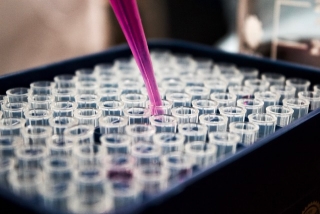Stevin Prize for Immunologist Ton Schumacher
Immunologist Ton Schumacher of the Netherlands Cancer Institute, also Professor at Leiden University Medical Center (LUMC), is being awarded the Stevin Prize. With the Spinoza Prize, the winners of which are also being announced today, this is the highest academic prize in the Netherlands. The Stevin Prize is awarded to researchers whose research has major social impact.
Ton Schumacher has unravelled one of the fundamental prerequisites for cancer immunotherapy, is working in close collaboration with clinical researchers to bring immunotherapy to patients, and has set up several spin-offs to ensure that the treatments that he is devising will actually be developed. Schumacher is a member of Oncode Institute, the virtual Dutch cancer research institute.
Fundamental research
How does the immune system work? That was the question that fascinated Ton Schumacher as a young scientist. ‘My original motivation was pure scientific curiosity’, he says. Over the years, however, he has increasingly felt an urgent need to do something with that knowledge. His early work, in the 1990s, was as yet unrelated to cancer. ‘We were particularly looking for cells infected by a virus. At that time I just had no idea that that knowledge would be so useful. For me, then, cancer immunotherapy is a real victory of basic research.’How does a T cell know that it should attack a cancer cell?
In 2018 two fellow pioneers of cancer immunotherapy, Jim Allison and Tasuku Honjo, were awarded a Nobel Prize. They wanted to know what the brakes on the immune system are. Schumacher’s question is actually even more fundamental: how does a T cell even know that it should attack a tumour cell? What makes a T cell look at a tumour cell and think, ‘that shouldn’t be here’? Schumacher has proved right in practice. The cancers with a relatively large amount of DNA damage, in particular, respond well to immunotherapy. Think of melanoma (damage from the sun) or lung cancer (damage from, for example, smoking).DNA damage
The key turned out to be DNA damage: the more DNA damage, the better the immune response. Cancer cells that have a lot of DNA damage present brand new protein fragments on their surface (neoantigens) that are absent on healthy cells. These alert the T cell. As a consequence, a dormant immune response develops in many patients, which can be amplified by immunotherapy. Practice has proved Schumacher right. The types of cancer that have relatively high levels of DNA damage respond particularly well to immunotherapy – melanoma (sun damage) or lung cancer (damage due for example to smoking), for instance.Measuring patients’ immune responses
Schumacher and his group are developing technology to measure patients’ immune responses. He has developed this technology at the Netherlands Cancer Institute van Leeuwenhoek Hospital, with Huib Ovaa. Huib died a month ago, far too young, so the prize is a homage to him too, says Schumacher. Schumacher will use 2,5 miljoen euros to build an algorithm which can predict whether a T-cell is able to recognize cancer cells.Clinical trials
Schumacher’s habitat is the lab, but he works with the hospital oncologists on a daily basis. He has initiated a series of innovative clinical trials at the Netherlands Cancer Institute along with clinical researchers John Haanen and Christian Blank. ‘There is a continuous flow of information in both directions between the lab and the hospital’, he says.Spin-offs
Schumacher is not only bringing his fundamental work into the clinical setting but also putting it on the market. He has set up four spin-offs, and a fifth one is in the pipeline. Why does he think that is important? ‘There came a time when it dawned on me that the last paragraph of an article often says, ‘It would be great to use this for ….’ But nobody takes that next step. I feel the challenge to actually take that next step.’Spinoza Price for Sjaak Neefjes
Besides Prof Schumacher, there has been more good news for Leiden. Sjaak Neefje, Professor of Chemical Immunology at Leiden University and Leiden University Medical Centre (LUMC) , has been awarded an NWO Spinoza Price.About the Spinoza Prize and the Stevin Prize
The NWO Spinoza Prize is the highest award in Dutch science. Each year, NWO awards Spinoza Prizes to three or four researchers working in the Netherlands who are regarded as among the very best by international standards. The Stevin Prize is the highest distinction in science for researchers or a two- or three-person team working in the Netherlands who have been particularly successful at leveraging knowledge for the benefit of society. NWO awards a maximum of two Stevin Prizes a year. The Spinoza and Stevin laureates each receive 2.5 million euros for research and/or activities related to knowledge utilisation.Venture Challenge
Ton Schumacher receives the Stevin Prize for his work on T cells for immunotherapy against cancer. He took part in the Venture Challenge with the start-up T-cell factory. Not long after that, T-Cell Factory was bought by Kite-Pharma, which partly thanks to this opened an office in the Netherlands and recently also opened production facilities which provides hundreds of new jobs. Source: LUMC